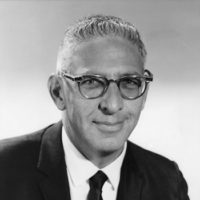
Nathan S. Kline
Rockland State Hospital
For the introduction and use of iproniazid in the treatment of severe depressions.
Dr. Kline more than any other single psychiatrist has been responsible for one of the greatest revolutions ever to occur in the care and treatment of the mentally ill. Literally hundreds of thousands of people are leading productive normal lives, who—but for Dr. Kline's work—would be leading lives of fruitless despair and frustration. Having pioneered the introduction and use of Rauwolfia and other tranquilizing drugs for the treatment of schizophrenia in 1954, Dr. Kline first reported in 1957 the beneficial effects of iproniazid, a monoamine oxidase inhibitor, in the treatment of severe depression.
His experiments confirmed the euphoric effect of iproniazid first reported in the treatment of tuberculosis. They were undertaken by Dr. Kline and his associates at Rockland State Hospital because the new tranquilizers were not proving useful in the treatment of severe depression. Deteriorated, regressed patients who had been hospitalized for long periods of time, and who had been unresponsive to other treatment, showed an improvement within a five-week period of observation. They became more alert, responsive and sociable. At the same time, more typical depressions treated in Dr. Kline's private practice showed an even more dramatic response to the drug, and thus demonstrated that many patients could be treated on an ambulatory basis and did not need to be hospitalized.
Since these early experiments, the use of the antidepressant drugs, both in mental hospitals and private psychiatric practice, has been developed and refined to a point where in the United States alone over four million patients a year are treated with antidepressant drugs.
For his persistence and leadership in the constant search for psychopharmaceuticals for the mentally ill, and for this new contribution which has released and restored to useful life hundreds of thousands of persons suffering from deep melancholia and profound despair, the 1964 Albert Lasker Clinical Research Award is given.
